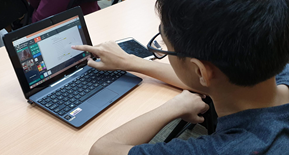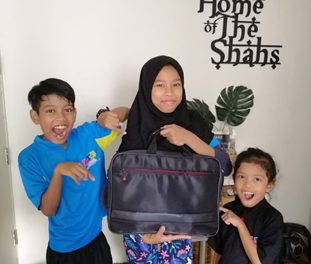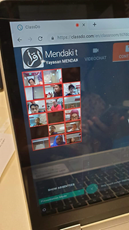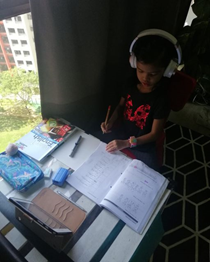9 min read
Helping Underprivileged Students Learn Online During The Pandemic
By: ClassDo on Aug 27, 2021 8:00:00 AM

27 Aug 2021

Despite the crisis, MENDAKI Tuition Scheme (MTS), a large-scale academic support programme for underprivileged Malay students in Singapore, adapted nimbly to remote lessons via ClassDo for more than 3,000 students and tutors within days, before Singapore’s lockdown began.
Even after the lockdown was lifted, MTS continued to run its classes online for the rest of the year to avoid disruptions to learning in a highly uncertain situation. By the end of 2020, attendance for MTS on ClassDo was in fact better than physical classes in previous years, despite challenges.
Against all odds
As eMTS’ students came from low-income families, ensuring that everyone had access to devices and reliable internet connection was critical. MENDAKI worked with various government agencies and community groups to resolve this quickly.

Home supervision for online lessons during the lockdown was not always adequate. As most of the students’ parents were blue-collar ‘essential service’ workers, they did not have the luxury of working from home during the lockdown. Coupled with various learning and socio-emotional challenges faced by the students, this meant that an online teaching platform that was interactive, engaging and yet easy to use would also be key in keeping students motivated to attend online lessons on their own.
Early head start
Thankfully, MENDAKI had the foresight to start experimenting with remote learning with education technology tools before the pandemic. As early as June 2019, it had already identified ClassDo as its interactive hyflex classroom platform of choice, and began pilot eMTS group classes to expand access to academic support in underserved parts of Singapore.
By the time the pandemic reached Singapore in February 2020, MENDAKI had decided swiftly and pre-emptively to move hundreds of physical classes for its secondary school students onto ClassDo.
Rapid scaling up to more than 3,000 students and tutors
Given eMTS’s large scale and the urgency of the situation, MENDAKI roped in ClassDo to help with rapid onboarding.
In a matter of a few days, a permanent classroom on ClassDo was created for every MTS class for weekly lessons. Tutors, admins and students could sign up and log onto the platform quickly and conveniently using any device, without the need to install any app or remember any password. Tutors could focus on teaching without having to spend time to mark attendance, as attendance was automatically captured on ClassDo.

Teaching and student engagement made easy
For eMTS tutors, preparing for their lessons and engaging their students were also a breeze.
They could upload their teaching materials directly to the built-in content library for each online classroom on ClassDo before their lessons, without the need to use a separate Learning Management System. Post-lesson, they could also assign and mark homework directly on ClassDo.
During lessons, eMTS tutors could also use various integrated tools on ClassDo, such as the whiteboard, annotation tools and poll to teach effectively. Their students learnt actively through working on their own copy of worksheets and notes in the same online classroom, which the tutors could monitor in real time and give instant guidance.
Comprehensive teacher training
Strong educator support was also an indispensable factor contributing to eMTS’ success.
As part of the pilot eMTS, ClassDo trained more than 50 tutors and administrative staff from MENDAKI in 2019. The training included imparting technical know-how of using ClassDo’s features, as well as sharing best practices on onboarding new students smoothly, adapting teaching resources to suit remote lessons, and engaging students online.

This training provided a strong foundation for MENDAKI to scale the coaching and mentoring internally to other eMTS tutors through peer tutor support and role-playing practices when eMTS was rolled out to the thousands in 2020.
Seamless tech support for everyone
Teacher training was complemented by strong support provided by ClassDo throughout the year. Through simple keyword search, users could access detailed step-by-step instruction guides on ClassDo’s online Help Centre instantly, round the clock.
Both teachers and students could also reach out to ClassDo directly via the technical support chat on ClassDo anytime. This ready access to instant live help took the pressure off tutors from having to do technical support themselves while conducting lessons.
Remote classes a boost for attendance

MENDAKI discovered that one of the greatest advantages of going remote was that students could join the lessons from anywhere. While a student might miss a physical lesson because no adult was able to take him to the class or if he were sick, with remote lessons, he would still be able to log on from the comfort of home. This contributed significantly to fewer classes missed and better attendance.
Convenient parent-teacher communications
Remote lessons made it easier for eMTS tutors to reach out to and keep parents regularly updated on how their children were doing. For example, it was more flexible to schedule parent-teacher conferences remotely on ClassDo itself.
eMTS widely lauded in media
What appeared initially to be an enormous task of moving more than 3,000 students and tutors online within tight time constraints and sustaining it for a year turned out to reap many benefits for eMTS eventually. eMTS’ success was widely featured in media such as Channel News Asia, Berita Harian, and BERITAmediacorp. It also won compliments from its own tutors.
Riding on this success, not only has MENDAKI continued running eMTS in 2021 as part of its blended learning initiative, it has also expanded the usage of ClassDo to its other programmes, such as homework support and mentoring.
4 min read
JIGE and ClassDo: Transforming Higher Education and Workforce Development together
Mar 25, 2024by ClassDo
The Japan Hub for Innovative Global Education (JIGE) is pleased to collaborate with Singapore-based ClassDo, bringing...
6 min read
Strategic alliance between ClassDo and Willseed corporation
Jun 30, 2023by ClassDo
ClassDo Pte. Ltd, a "Future of Work" platform based in Singapore (CEO Chung Chiew Farn, hereinafter referred to as...

